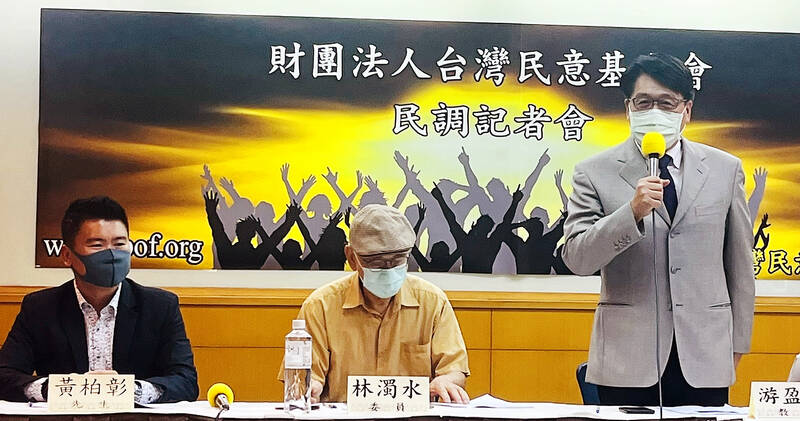A slight majority of Taiwanese lack confidence in the government’s ability to defend the nation, the results of a poll published yesterday by the Taiwanese Public Opinion Foundation showed.
The survey showed that 51.5 percent of respondents were not confident in the government’s ability to defend the nation against a hypothetical Chinese invasion, comprising 21.1 percent who “somewhat” lacked confidence and 30.4 who had “no confidence,” the foundation told a news conference in Taipei.
It showed that 41.2 percent have confidence in the government’s ability to defend Taiwan, comprising 13.9 percent of the total who were “highly confident” and 27.3 percent who were “somewhat confident.”

Photo: Chen Yu-fu, Taipei Times
The foundation said 4.2 percent of respondents had no opinion, while the remainder said they did not know.
President Tsai Ing-wen’s (蔡英文) management of cross-strait ties garnered 48.6 percent approval among the respondents, comprising 15.5 percent who “highly approved” and 33.1 percent who “somewhat approved,” the survey showed.
However, 43.3 percent did not approve of her management of cross-strait ties, comprising 19.1 percent who “somewhat disapproved” and 24.3 percent who “highly disapproved,” the foundation said, adding that 6.1 percent had no opinion.
The poll found that 43.6 percent agreed that Taiwan’s armed forces have responded weakly to China’s military threats, while 42.4 percent disagreed with the statement, it said, adding that 7 percent expressed no opinion.
Asked whether Taiwan or China would win if a conflict were to start tomorrow, 29.6 percent said Taiwan, 51.2 percent said China and 10.7 percent said the result would be too close to call, it said.
Asked which country would win the Russia-Ukraine war, 47.4 percent said Ukraine, 25.1 percent said Russia and 13.9 percent said the result is too close to call, the poll showed.
The public’s lack of confidence in the nation’s defenses suggests that Taiwanese either think the nation’s armed forces are less prepared than Ukraine’s, or the world would not support Taiwan in the event of a Chinese attack, former legislator and political commentator Lin Cho-shui (林濁水) said.
As the US has turned its strategic focus on the Asia-Pacific region and needs to protect the microchip supply chain for economic reasons, Taiwan should be in a better position than Ukraine to garner Washington’s support, Lin said.
US President Joe Biden has said on multiple occasions that the US would defend Taiwan if China were to invade, he said.
These considerations indicate that Taiwanese’s anxiety about national defense stems from a lack of confidence in the armed forces, he said.
Still, the poll showed public confidence in the military has improved since the Chinese Nationalist Party (KMT) held the presidency, Lin said.
The survey among Taiwanese of voting age was conducted on Monday and Tuesday last week by telephone, collecting 1,005 valid samples. It has a confidence level of 95 percent and a margin of error of 3 percentage points.

POSITIVE DEVELOPMENT: Japan and the US are expected to hold in-depth discussions on Taiwan-related issues during the meeting next month, Japanese sources said The holding of a Japan-US leaders’ meeting ahead of US President Donald Trump’s visit to China is positive news for Taiwan, former Japan-Taiwan Exchange Association representative Hiroyasu Izumi said yesterday. After the Liberal Democratic Party’s landslide victory in Japan’s House of Representatives election, Japanese Prime Minister Sanae Takaichi is scheduled to visit the US next month, where she is to meet with Trump ahead of the US president’s planned visit to China from March 31 to April 2 for a meeting with Chinese President Xi Jinping (習近平). Japan and the US are expected to hold in-depth discussions on Taiwan-related issues during the

‘LIKE-MINDED PARTNER’: Tako van Popta said it would be inappropriate to delay signing the deal with Taiwan because of China, adding he would promote the issue Canadian senators have stressed Taiwan’s importance for international trade and expressed enthusiasm for ensuring the Taiwan-Canada trade cooperation framework agreement is implemented this year. Representative to Canada Harry Tseng (曾厚仁) in an interview with the Central News Agency (CNA) said he was increasingly uneasy about Ottawa’s delays in signing the agreement, especially as Ottawa has warmed toward Beijing. There are “no negotiations left. Not only [is it] initialed, we have three versions of the text ready: English, French and Mandarin,” Tseng said. “That tells you how close we are to the final signature.” Tseng said that he hoped Canadian Prime Minister Mark Carney

President William Lai (賴清德) yesterday bestowed one of Taiwan’s highest honors on Saint Vincent and the Grenadines (SVG) Ambassador Andrea Clare Bowman in recognition of her contributions to bilateral ties. “By conferring the Order of Brilliant Star with Grand Cordon on Ambassador Bowman today, I want to sincerely thank her, on behalf of the Taiwanese people, for her outstanding contribution to deepening diplomatic ties between Taiwan and SVG,” Lai said at a ceremony held at the Presidential Office in Taipei. He noted that Bowman became SVG’s first ambassador to Taiwan in 2019 and

A man walks past elementary school artworks at the Taipei Lantern Festival in Ximen District yesterday, the first day of the event. The festival is to run from 5pm to 10pm through March 15.